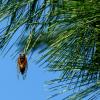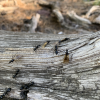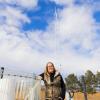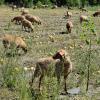Climate & Environment
 If you were at CU Boulder in April 1970, you were likely aware―very aware―of the first Earth Day. Two CU Boulder professors explain Earth Day’s history, impact, what it’s become and if it’s still relevant.
If you were at CU Boulder in April 1970, you were likely aware―very aware―of the first Earth Day. Two CU Boulder professors explain Earth Day’s history, impact, what it’s become and if it’s still relevant. Just in time for Earth Day, CU Boulder Professor Phaedra Pezzullo discusses her new book “Beyond Straw Man,” on the online and offline controversies regarding the global social movement to ban plastics.
Just in time for Earth Day, CU Boulder Professor Phaedra Pezzullo discusses her new book “Beyond Straw Man,” on the online and offline controversies regarding the global social movement to ban plastics. Mountain chickadees have among the best spatial memory in the animal kingdom. New research identifies the genes at play and offers insight into how a shifting climate may impact the evolution of their memory skills.
Mountain chickadees have among the best spatial memory in the animal kingdom. New research identifies the genes at play and offers insight into how a shifting climate may impact the evolution of their memory skills. This summer in 15 states across the Southeast and Midwest, two cicada broods will emerge simultaneously for the first time since 1803. CU Boulder’s Sammy Ramsey offers insight on these singing, red-eyed bugs and how they benefit the planet.
This summer in 15 states across the Southeast and Midwest, two cicada broods will emerge simultaneously for the first time since 1803. CU Boulder’s Sammy Ramsey offers insight on these singing, red-eyed bugs and how they benefit the planet. Ant species living in Boulder’s foothills have shifted their habitat over the last six decades, potentially affecting local ecosystems, suggests a new CU Boulder study.
Ant species living in Boulder’s foothills have shifted their habitat over the last six decades, potentially affecting local ecosystems, suggests a new CU Boulder study. CU Boulder and Colorado State University researchers are teaming up to improve river water quality using machine learning.
CU Boulder and Colorado State University researchers are teaming up to improve river water quality using machine learning. CU Boulder's Katja Friedrich is known for her work in cloud seeding, a process used to generate precipitation from existing clouds.
CU Boulder's Katja Friedrich is known for her work in cloud seeding, a process used to generate precipitation from existing clouds. A new analysis from 2,655 farms on five continents suggests that moving away from industrial, monoculture farming could benefit both the planet and people.
A new analysis from 2,655 farms on five continents suggests that moving away from industrial, monoculture farming could benefit both the planet and people. A new paper co-authored by CU Boulder professors lays out a blueprint for mandating indoor air quality standards for public buildings.
A new paper co-authored by CU Boulder professors lays out a blueprint for mandating indoor air quality standards for public buildings. A paper co-authored by CU Boulder doctoral candidate Claire Powers offers a potential solution to a pesky problem, clustering similar farming practices together.
A paper co-authored by CU Boulder doctoral candidate Claire Powers offers a potential solution to a pesky problem, clustering similar farming practices together.


